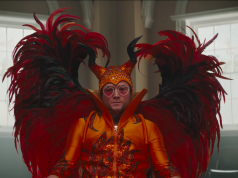No modern writer I’m aware of is better at telling bizarre, funny personal anecdotes than David Sedaris. The best of his essays, collected in such books as “Barrel Fever,” “Me Talk Pretty One Day,” and “Holidays on Ice,” focus on things that really happened to him (allowing for a little poetic license), and that are highly unusual, but that hint at universal themes anyone can relate to. He’s at once a unique oddball with a seemingly endless supply of embarrassing stories, and a nerdy Everyman who speaks for us all.
None of Sedaris’ stories are what you’d call “cinematic,” but some have enough meat on them to be expanded into autobiographical-type films. That includes “C.O.G.,” from Sedaris’ 1997 compilation “Naked,” in which he describes the months he spent in the Pacific Northwest as a college student, working as an apple picker and in other odd jobs. What we soon discover in Kyle Patrick Alvarez’s well-intentioned big-screen adaptation, however, is that it’s not necessarily the events Sedaris describes that make his essays enjoyable; it’s the words he uses to describe them, the deft turns of phrase and the wry narration. Without Sedaris’ voice (his writer’s voice, I mean, though his actual speaking voice helps too), the story falls flat.
In the film, the fictionalized version of David Sedaris, a brainy naif played by Jonathan Groff (from TV’s “Glee”), shows up in Oregon wearing his Yale sweater and eager to have some rustic, character-building experiences. Calling himself Samuel for purposes of reinvention, David finds work at an apple orchard where he’s the only English-speaking non-immigrant, and where he makes little effort to fit in or understand his fellow laborers.
He later graduates to an indoor job sorting apples on a factory line. (We get the feeling the boss, played by Dean Stockwell, took pity on the lad and tried to find him work he was better suited for.) His coworkers here speak English, but they aren’t Yale-educated Easterners, and David — despite his professed interest in personal growth and enlightenment — again does nothing to relate to them. They think he’s something of a blowhard, and they’re right.
Does David not realize he’s being smug and precious with all his philosophical talk and high-falutin’ language? Evidently not: “I think everybody else is just so intimidated by me,” he says to his one friend, Curly (Corey Stoll). “They don’t know how to talk to me.”
The real opportunity for self-discovery comes later still, when David is befriended by Jon (the wonderful Denis O’Hare), an unfailingly cheerful evangelical Christian whose religiosity hides a fiery temperament. (“C.O.G.” stands for “Child of God.”) David teams up with him to carve Oregon-shaped clocks out of jade to sell at a farmers market. Meanwhile, David is coming to terms with his sexuality, and has an amusing liaison with Curly.
Groff is fine, but he isn’t quirky or ill-at-ease enough to adequately personify the awkward, weird charm of Sedaris’ stories. He’s too normal, too handsome. And without the character’s running commentary on the kooky people he encounters, it’s hard to know what he’s thinking, how it’s affecting him, what (if anything) he is learning. Some films rely too heavily on voice-over narration; “C.O.G.” is one that could have benefited from it, as it would have preserved the author’s acute satirical point of view.
But it’s not a total wash. Writer-director Alvarez (whose first film, “Easier with Practice,” was about a different sort of misfit) worked hard to get Sedaris’ permission to adapt the essay, and his fondness for the material shines through in the film’s open heart and good intentions. A few scenes of picaresque comedy hint at the gloriously off-kilter production it could have been. Maybe next time. I think a movie version of “The Santaland Diaries” could be amazing.
C (1 hr., 28 min.; )
Originally published at About.com.





